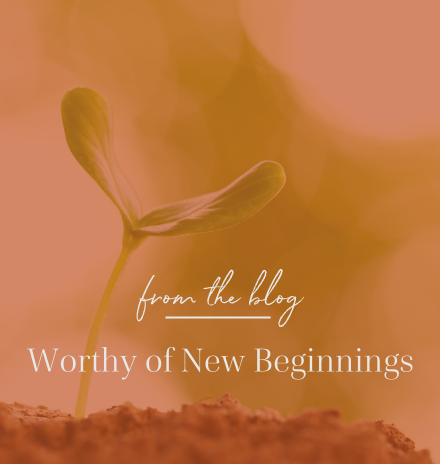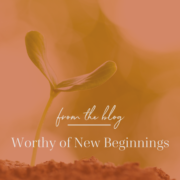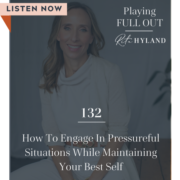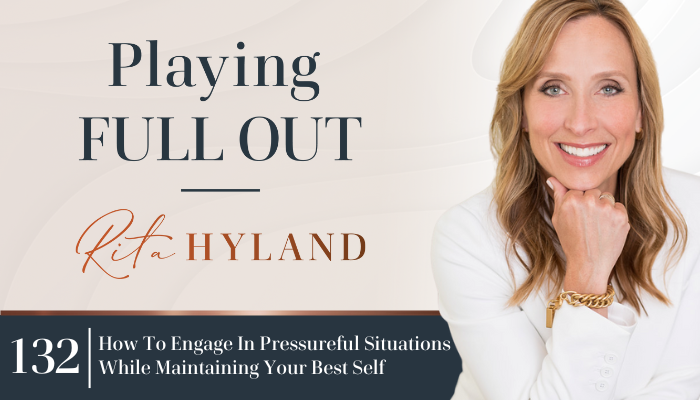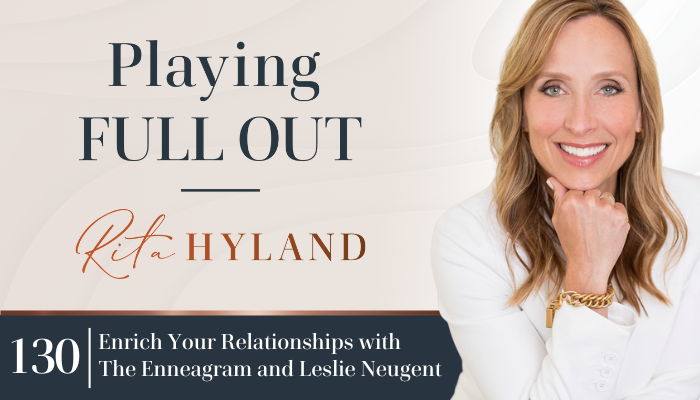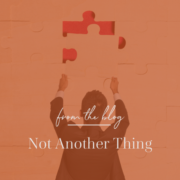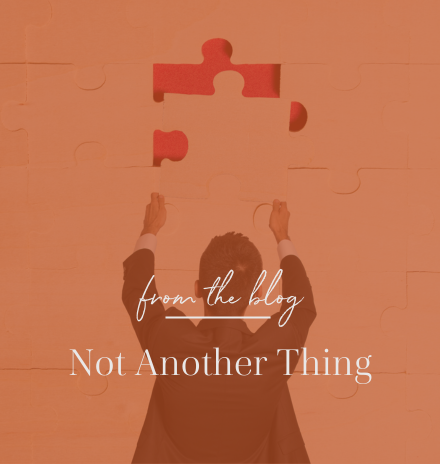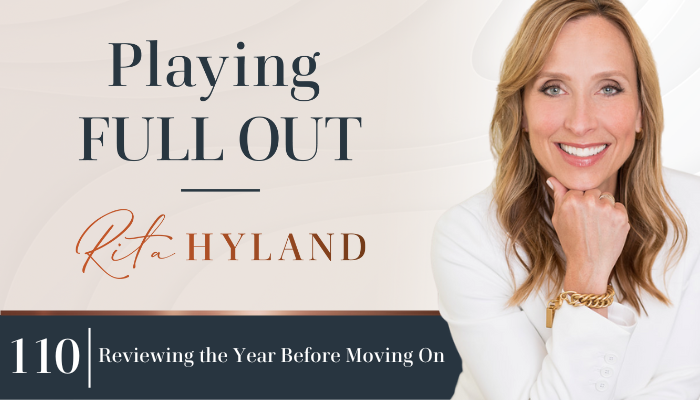
Listen to the full podcast episode to learn about the science-backed practice that has not only changed my life but also the lives of countless people over the last two decades. This is something you can’t ignore if you want to achieve that great goal you identified for this year and write your new future.
Today we’re continuing our conversation about expanding and improving your self-awareness, leadership, and relationship growth through the profound and popular Enneagram assessment.
Maybe you’ve never done self-growth work before, or maybe you’re someone like me who has spent decades doing personal growth work—either way, you’ll find this to be extremely enlightening! There’s so much to the Enneagram—you can go as shallow or as deep as you’d like with the material. Think of it as a life-long journey.
The very best part of this episode is my guest. She’s the sought-after relationship consultant, Enneagram expert, and wise woman—whom I get to call a friend—Leslie Neugent.
Leslie has had leadership roles in business, academics and in ministry. After earning her undergraduate and Master’s degrees from Northwestern University, Leslie began her career in advertising. Though she successfully rose through the ranks to become a Vice President, she decided that the advertising world wasn’t a good match from her spirit. She then went to work for for Texas Christian University in Fort Worth and served as the Director of Admissions for the MBA Program. After taking some time off for motherhood, she entered seminary training where she got her Master’s in Divinity Degree and became a Minister.
How did Leslie get started with the Enneagram?
Leslie was introduced to the Enneagram as part of her seminary training, and she found it to be such an incredible tool for her own personal growth that she went on to be mentored by the internationally renowned Enneagram master, teacher, and author, Russ Hudson. Leslie became certified as an Enneagram teacher and consultant through the Enneagram Institute in New York, and then in 2020, launched her own relationship consulting business called Relationship Matters.
“I had an experience with the Enneagram in seminary where I realized to be a minister, I had to work on some of my blind spots that came with my Enneagram.”
The Enneagram was remarkably transformative for her and sparked her interest in the tool.
“I came to realize that there are some very, very specific and nuanced themes that people struggle with and deal with in relationships. Once they become aware of them and realize that there are places they’re stuck and where they have superpowers they’re overusing which can crash into other people that they love’s nervous systems—that is where the money line is.”
Who does Leslie work with?
Today, Leslie works with individuals, couples, families, businesses and groups to help develop the self-awareness that’s necessary for us to heal, grow and optimize our relationships. She’s a speaker, consultant and workshop leader.
My family and I have had the privilege of working with Leslie using the Enneagram and am delighted to have this opportunity to introduce her to you.
What is the Enneagram?
The Enneagram is a psychology-spiritual tool that helps us recognize that tells us a lot of things about ourselves, primarily where we’re stuck.
There are nine types within the Enneagram. It identifies what your superpower or gift is that you’ve developed as your way of showing up. The ego needs a way to show up and feel valued and the Enneagram organizes that information into 9 buckets.
Think about B.F. Skinner and his work around positive reinforcement. As children, we need that and these gifts are survival mechanism. This is a beautiful thing because we start learning where we fit in the world, and how we can move forward, strive, thrive, and survive. We lean into that and we get good at it.
How does the Enneagram work and why does it matter to leadership and relationships?
In these nine types, there are nine different coping mechanisms or different ways of showing up and feeling valued. They are all necessary and good.
What happens as we get older and our ego takes the wheel is that we fall asleep to all other possibilities of how we can show up, which is very limiting and in some cases can be damaging. And this is how our unique motivation is formed.
We show up into a family system that’s in action. The movie is already happening. The family system may be healthy, may not be, but your little baby self shows up.
And as a child in those pre-language, toddler-ish years, we have a special survival mechanism which B.F. Skinner termed “behaviorism.”
We start trying different things. We get assertive, stomp our feet, and yell. Because, again, this is pre-language and all we have to express ourselves are our actions.
You might get language back to you about being quiet, what the right thing to do is, or how you “should” behave. Perhaps you get non-verbal cues about what you should or should not be doing. Whatever the response is, our nervous systems are receiving this information and learning what to do to protect ourselves.
And from there, we learn what the reward system is which helps us develop our coping mechanism. The problem is, we don’t grow out of that or intuitively learn how to balance our gifts once we hit adulthood. That’s where the Enneagram comes in.
The Enneagram groups these coping mechanisms together in 9 different groups, which are categorized as Types. Each group has its own network of motivations and behaviors.
When we talk about our number (or our Type), think of it as your home base. It’s your superpower or gift, but it can also be your Achilles heel.
This is where we grow from. One of the dangers in Enneagram work (when it’s done too superficially) is it becomes our badge. We can begin to “blame” things on our Enneagram type instead of using it as a tool to inspire personal and professional growth.
First we get aware—80% of things can be changed simply with the awareness of them. And then the Enneagram gives you a roadmap for what to do with that awareness.
Brief introduction to the motivations of the 9 Enneagram personality types
What I love about the Enneagram is the whole idea that every single one of the nine types is a superpower—all of them are good.
The Enneagram is so rich because it’s so positive. It is such a simple system, and yet you can get very deep with it as well.
There are essentially 3 tiers to the system: liberated, evolved, and restricted. When we’re at our most liberated or our most evolved, that’s when we are using our superpower to its five-star level. When we’re overusing our gift (think of it almost like an Achilles heel), that’s when we are relying on it too heavily, and we have to be aware.
There is in fact so much to the Enneagram that we’ve decided to split this into two parts. What follows is the Enneagram basics for Type 3, 4, 5, 6, and 7. You can find Type 8, 9, 1, and 2 over here!
Type 3
(This is me!)
Type 3’s superpower or gift
The Achiever or The Performer. This is a productive energy. They’re assertive, they’re leaders, and they’re incredibly efficient! 3’s just know how to get the job done and done well.
3’s are also chameleons. Leslie has seen many high level executives that are 3’s lose who they are because they’re so busy being what the world wants and needs them to be.
How are Type 3’s motivated?
3’s are in the Shame Triad with 2’s and feel that they must do something in order to be valued. They feel like they have to get this thing done quickly so they can move on to the next thing they have to get done!
Type 3’s should be aware of
3’s have to learn to bring their heart back into the space, which is tough for them because feelings can be really inefficient. While that may be true in the short term, relationships will actually make the achievements even sweeter in the long run.
Type 4
(Leslie’s son is a 4.)
Type 4’s superpower or gift
The Individualist. They’re our artists, musicians, and creators. They see beauty where, often, many of us don’t.
They’re a sensitive energy and have an ability to hold all of the hard and light emotions—without trying to fix it. (This is very different from most—if not all—of the other Types who like to fix things.)
How are Type 4’s motivated?
Early on in life, they learn that they need to be different to be valued. They’re in the Fear Triad. So they may fear being abandoned and therefore make themselves such that they stand out from the crowd.
Type 4’s should be aware of
4’s work so hard to be different and unique, yet they become jealous of the “common man” and sense of “normal.” It’s important for 4’s to realize this is a box they put themselves in and that they can rewrite the script if they’d like!
Type 5
Type 5’s superpower or gift
The Observer or The Investigator. This is a suspicious energy. They have sober judgment—they can be objective. 5’s possess an extremely steady energy and will give a very reasoned point of view.
How are Type 5’s motivated?
They’re thinkers and live in the theme of fear. When they’re young, they perceive that resources are limited. They like to dive deep and become expert on things.
Type 5’s should be aware of
Because they have that perception from childhood that there’s not enough to go around, 5’s tend to hoard whatever it is they have—whether it be information, resources, money, etc. They can become busy analyzing life instead of living it.
Type 6
(One of my daughters is a Type 6)
Type 6’s superpower or gift
The Loyalist or The Skeptic. (Think of 6’s as a lite Type 8.) They have much of the same big, assertive energy—minus the anger of an 8. They’re like the Boy Scouts of the Enneagram. They’re loyal, trustworthy, and honest.
They have an intense sense of responsibility to their inner circle—family, friends, or colleagues. 6’s have very much of a “leave no man behind” energy.
How are Type 6’s motivated?
6’s want certainty. They want to be sure of their next steps and are motivated by fear. 6’s are a worrying energy. They’re in the Fear Triad with 5’s and 7’s.
6’s often operate from this mentality of “I must get this right and know the answer. Because of this they’ll seek to gather more and more information. But the thing is, there’s no such thing as being 100% sure. 6’s only need to do their best and then let it go.
Type 6’s should be aware of
They can have a cynical view of the world, they’re suspicious and jump to the worst case scenario. But sometimes the one who can only see what’s wrong, can only see what could go wrong—and that can be a hard place to live.
Type 7
Type 7’s superpower or gift
The Enthusiast or The Adventurer. This is the positive outlook energy extraordinaire. They can take anything that happens and find the silver lining. They’re fun, visionaries, and love new ideas!
How are Type 7’s motivated?
7’s are in the Fear Triad. They learn young to dust themselves off when they fall off the bike or a relationship ends and just keep going.
Their fear is related to not wanting to look at their inner world (emotions), and to help with this they keep their minds occupied.
Type 7’s should be aware of
When 7’s get frustrated, they get irritable because you’re holding back the fun of life. They don’t learn the tools for sitting in things that are hard or painful (for example: metabolizing grief). So they will become distracted and numb themselves to be distracted and not have to address the hard things.
Freshen up on Types 8, 9, 1, and 2.
In this episode, I share:
- Real examples to show what makes the Enneagram different, how it works, and how it improves relationships in homes and in the workplace
- Why the worst part of you is the best part of you
- How relationships without self-awareness can lead to misunderstanding and self-deception
- Where you can take a reliable Enneagram assessment
Resources and related episodes:
Subscribe on Apple Podcasts for more tips, tools, and inspiration to lead the optimal vision of your life, love, and leadership. Remember, a half version of you is not enough. The world needs the fullest version of you at play.

___
About Rita Hyland
With over 20 years of experience as an executive and leadership coach, Rita helps leaders — emerging and established — excel in corporate and entrepreneurial environments.
Rita believes if leaders were more clear about how transformation really works and more intentional about creating what they want, their impact, success, and influence in the world would be unstoppable.
Through her coaching programs, private coaching, and masterminds, Rita shows leaders how to win consistently and create the impact and legacy they desire.
Central to Rita’s work is the understanding that you will never outperform your current programming, no matter how strong your willpower.
When you learn to use Rita’s proprietary Neuroleadership Growth Code, a technology that uses the best of neuroscience and transformational psychology to hit the brain’s buttons for change, YOU become both the solution and the strategy.
Her mission is to end talented, hard-working, and self-aware leaders spending another day stuck in self-doubt or confusion and not contributing their brilliant work and talent the world so desperately needs.
